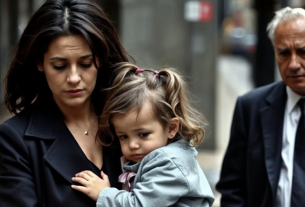— “Do you have your own car? Or are you planning to rely on Kostya’s?”
Nika froze with a glass of juice halfway to her lips. At that moment, Kostya was slicing cheese at the kitchen counter; a slow flush crept over his cheeks.
The woman who had just entered the apartment stood in the doorway like an actress stepping onto a stage. Larisa Arkadyevna—so Kostya had introduced his mother a minute earlier—looked impeccable: perfectly coiffed blond hair, a charcoal tailored suit, pearl earrings. And her gaze—cold, appraising, like a jeweler determining a stone’s authenticity.
A warning bell flashed in Nika’s head.
“Mama,” Kostya finally spoke up, “we agreed…”
“Agreed on what, son?” Larisa Arkadyevna slipped off her coat and hung it up with a practiced motion. “I’m merely asking practical questions. Nika is a grown woman; she understands the importance of financial stability.”
Nika set her glass on the coffee table and stood. She extended her hand for a handshake, trying to smile as naturally as possible.
“Nice to meet you. Kostya’s told me a lot about you.”
Larisa Arkadyevna shook her hand—quickly, formally, as if performing an unpleasant duty.
“I hope only good things. My Kostyushka is impressionable—prone to embellishment.”
The next hour turned into an interrogation. Larisa Arkadyevna settled into an armchair opposite Nika, crossed her legs, and clasped her fingers over her knee. The questions poured out one after another: where she worked, how much she earned, who her parents were, whether she had her own apartment, whether she planned to have children and exactly when.
“I’m a psychologist at a private clinic,” Nika answered, trying to remain calm. “The salary is decent; I rent a one-bedroom not far from here.”
“Psychologist,” Larisa Arkadyevna drew the word out as if tasting it. “And why study the humanities? You could have chosen something more… practical. Law. Economics.”
“I like helping people.”
“You can help people while having a normal profession. And when are you planning children? Kostya is already thirty-two—it’s time to think about continuing the family line.”
Kostya sat beside Nika on the sofa, silent and tense. Occasionally he tried to intervene and shift the conversation, but his mother cut off his attempts with a single look.
When at last Larisa Arkadyevna left, citing important errands, Nika exhaled. Kostya hugged her and buried his face in her shoulder.
“I’m sorry. She’s just worried about me. It’ll pass, you’ll see.”
Nika stroked his hair and thought about how they had met four months earlier. It was at a professional development course—Kostya worked as an HR manager and had decided to study the basics of psychology. He had seemed so open, sincere. Ready to listen for hours, laugh at her jokes, marvel at the stories from her practice. After two months of dating they decided to move in together—rented a larger apartment and set it up side by side.
“She’s inviting us to Sunday lunch,” Kostya said a week later. “She wants to make her signature casserole. And teach you her special recipe.”
Nika agreed. After all, a relationship with your fiancé’s mother matters. You need to find common ground, to show you’re worthy of her son.
Sunday lunch began with Larisa Arkadyevna letting her gaze travel critically over Nika’s outfit.
“Cute dress. Fast fashion?”
At the table Nika received one tablespoon of salad and a tiny piece of casserole.
“You do watch your figure, don’t you?” asked Larisa Arkadyevna, heaping a triple portion onto Kostya’s plate. “At your age that’s important. After twenty-five the metabolism slows down.”
The conversation over lunch circled the same themes: money, career, future plans. Larisa Arkadyevna spoke of acquaintances whose children had married well—one to an oil magnate’s daughter, another to the heiress of a restaurant chain.
“And what do your parents do?” she asked Nika.
“Dad’s an engineer at a factory; Mom’s an elementary-school teacher.”
“I see.” There was so much condescension in those two words that Nika felt her cheeks start to burn.
After lunch, she called Nika into the kitchen—supposedly to show the casserole recipe. But instead of culinary secrets came a “heart-to-heart.”
“Kostya is impressionable,” she said, wiping down an already spotless countertop. “He can’t stand pressure or conflict. I know him better than anyone. I raised him alone, without a father. Devoted my life to him.”
She turned to Nika, and something predatory flickered in her eyes.
“You’re not from our circle. You’re too… independent. It’s unsettling. Men need women who are softer, more compliant. Who know how to adjust.”
Nika kept silent. What was there to say? She looked at this woman and understood: Larisa Arkadyevna would never accept her. She would never see her as a worthy match for her son. And Kostya… Kostya was used to being led. First by his mother, now he was trying to find a woman who would take over that role.
The next two weeks were spent trying to build bridges. Nika called Larisa Arkadyevna to ask about her health. Invited her to the theater, to a restaurant. Received polite refusals.
The third “family gathering” ended in a blow-up. Larisa Arkadyevna criticized everything: how Nika dressed (“too provocative”), how she spoke (“you pontificate too much”), how she ran the household (“Kostya’s lost weight—aren’t you feeding him?”).
For the next two weeks Nika tried her very best. On Monday she phoned to ask how the weekend had gone.
“Fine, thank you,” came the dry reply before the line went dead.
On Wednesday Nika texted an invitation to a premiere at the Maly Theater—she’d procured tickets through acquaintances.
“Unfortunately, I’m busy,” came the response three hours later.
On Friday she suggested dinner at a new Italian restaurant.
“I have other plans.”
Kostya saw these efforts, winced, but said nothing. Only once did he say, “You don’t need to try so hard. Mom will warm up over time.”
But time passed and Larisa Arkadyevna did not warm up. On the contrary, with each meeting she grew colder.
The third “family evening” took place two weeks later. The entire night Larisa Arkadyevna picked at everything: “You’re not feeding Kostik—he’s wasting away,” then, “You talk down to people—well-bred people don’t do that.”
“And the way you dress, Nika!” she continued relentlessly. “Those short skirts, those tight jeans. A decent girl doesn’t go out like that. What will people think? That Kostya got mixed up with some… frivolous creature.”
“I dress just fine. Modern.”
“Modern!” Larisa Arkadyevna threw up her hands. “Your generation will be the ruin of everything. No modesty, no respect for tradition. Everything must be modern, everything allowed.”
They were silent in the taxi. At home, Kostya apologized over and over, promising he would talk to his mother, that things would get better. But Nika already knew—nothing would get better. And there would be no talk. Because Kostya wasn’t capable of having it.
The next day the phone rang. Larisa Arkadyevna asked to meet. Without Kostya. Face-to-face.
They met in an expensive café downtown. Larisa Arkadyevna ordered an espresso; Nika, a cappuccino. For several minutes they sat in silence.
“Let’s speak plainly,” Larisa Arkadyevna said at last. “You’re a grown, intelligent woman. And you understand perfectly well—you and Konstantin are not suited to each other.”
“What makes you so sure?”
“Because I know my son. He needs a simpler woman. One who won’t pry into his soul with her psychology. One who will make a cozy home rather than build a career. One who will give him children and be happy in the role of wife and mother.”
She paused and took a sip of coffee.
“Leave. Now. While there’s no scandal. While I can still keep my respect for you.”
“And if I don’t?” Nika asked, surprised at her own calm.
“Then I’ll turn your life into hell. I’ll show up every day. Call every hour. Kostya won’t stand it. He doesn’t know how to oppose me—you see that. And in the end he’ll choose me. Because I’m his mother. And you’re just the next girl.”
It wasn’t a hysterical outburst. Not a threat in the usual sense. It was a businesslike proposal from someone absolutely certain of her influence.
Nika walked home, though it was several kilometers to the apartment. She needed to think. For the first time in all these months she didn’t cry. Didn’t hope things would improve. Didn’t scheme about winning Larisa Arkadyevna over.
She simply opened her eyes.
Her love for Kostya had been real. At least on her side. But it was one-sided. Kostya loved her in his own way—as he was able. As his mother allowed him. He wasn’t ready to stand between them and defend their relationship. He kept waiting for things to sort themselves out. For his mother to get used to it. For Nika to adapt.
He simply hadn’t grown up. He’d stayed that boy whose mother held his hand on the way to school. Who chose his friends, his hobbies, his university for him. And now was choosing his wife.
That evening Nika called Kostya. She said they needed to talk. He rushed over in half an hour, anxious, with a bouquet of her favorite white roses.
“I’m leaving,” she said without preamble.
“What? Why? What happened?”
She told him about the meeting with his mother. About her words. About her decision.
“But… we can work this out. I’ll talk to her. I’ll explain…”
“You won’t explain, Kostya. Because you never chose me. In all these months you never once took my side. You never once told your mother this is your life and your choice. You just waited for me to adapt. To become convenient.”
“That’s not true!”
“It’s exactly true. And you know what? Beside you I’ll always be second. First place is already taken. Forever.”
She packed that very night. Kostya sat in the kitchen with his face in his hands. From time to time he tried to say something, to plead, but the words stuck in his throat.
A month passed. Nika rented her old one-bedroom again and returned to her usual life. Sometimes Kostya called—quietly, uncertainly. Asked if they could meet, talk. She answered, “No. You’ve already shown me everything.”
Sitting in a café with a friend, Nika watched a couple by the window—young, happy, full of hope. And she thought:
“When you marry, you don’t just get a husband. You get his past, his weaknesses, his fears. His mother. And I want a man beside whom I will feel like a woman—loved, desired, the one and only. Not a contestant auditioning for the role of convenient daughter-in-law.”
She finished her coffee and was the first to stand. Not because she was weak or resentful. But because she no longer wanted to fight for a place that should have been hers by right—especially if the prize was a person who never became a man.



